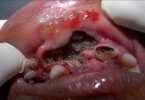What's in this article?
What is Strep Throat?
Strep throat is a bacterial infection that causes inflammation and pain in the throat. This common condition is caused by group A Streptococcus bacteria. Strep throat can affect children and adults of all ages. However, it’s especially common in children between the ages of 5 and 15. Sneezing and coughing can spread the infection from one person to another.
Strep Throat Causes
The cause of strep throat is bacteria known as Streptococcus pyogenes, also known as group A streptococcus.
Streptococcal bacteria are highly contagious. They can spread through airborne droplets when someone with the infection coughs or sneezes, or through shared food or drinks. You can also pick up the bacteria from a doorknob or other surface and transfer them to your nose, mouth or eyes.
Strep Throat Symptoms
Common symptoms of strep throat in children and adults include:
- Severe and sudden sore throat without coughing, sneezing, or other cold symptoms.
- Pain or difficulty with swallowing.
- Fever over 101°F (38.3°C). Lower fevers may point to a viral infection and not strep.
- Swollen lymph nodes in the neck.
- White or yellow spots or coating on the throat and tonsils.
- Bright red throat or dark red spots on the roof of the mouth at the back near the throat.
- Swollen tonsils, although this symptom may also be caused by a viral infection.
Strep Throat Symptoms on children compared to adults
Some of the general and constitutional symptoms of strep throat infection may vary quite a bit depending on the individual’s age.
- Infants primarily experience a thick “colorful” (yellow or green) drainage from the nose and possibly a low-grade fever, with fussiness, irritability, and a decrease in appetite.
- Children aged one to three (“toddlers”) may complain of a sore throat, trouble swallowing, poor appetite, crankiness, and swollen glands (lymph nodes) beneath the jaws.
- Older children and adolescents generally look and feel awful with strep throat. They can have high fevers, very painful throats, often severe difficulty swallowing, and pus, which can sometimes be seen covering the tonsils.
- Adults with strep throat may have milder symptoms, and in some cases the illness may be undetected. Symptoms vary; adults may also have severe pain and trouble swallowing.
Strep Throat Treatment
Most sore throats are caused by viruses, not bacteria.
A sore throat should be treated with antibiotics only if the strep test is positive. Antibiotics are taken to prevent rare but more serious health problems, such as rheumatic fever.
Penicillin or amoxicillin are most often the first drugs to be tried.
- Certain other antibiotics may also work against the strep bacteria.
- Antibiotics should be taken for 10 days, even though symptoms are often gone within a few days.
The following tips may help your sore throat feel better:
- Drink warm liquids, such as lemon tea or tea with honey.
- Gargle several times a day with warm salt water (1/2 tsp or 3 grams of salt in 1 cup or 240 milliliters water).
- Drink cold liquids or suck on fruit-flavored ice pops.
- Suck on hard candies or throat lozenges. Young children should not be given these products because they can choke on them.
- A cool-mist vaporizer or humidifier can moisten and soothe a dry and painful throat.
- Try over-the-counter pain medicines, such as acetaminophen.
Strep Throat Complications
Although strep throat isn’t dangerous, it can lead to serious complications. Antibiotic treatment reduces the risk.
Spread of infection
Strep bacteria may spread, causing infection in:
- Tonsils
- Sinuses
- Skin
- Blood
- Middle ear
Inflammatory reactions
Strep infection may lead to inflammatory illnesses, including:
- Scarlet fever, a streptococcal infection characterized by a prominent rash
- Inflammation of the kidney (poststreptococcal glomerulonephritis)
- Rheumatic fever, a serious inflammatory condition that can affect the heart, joints, nervous system and skin
Researchers are investigating a possible link between strep infection and a rare condition called pediatric autoimmune neuropsychiatric disorder associated with group A streptococci (PANDAS). PANDAS is a term used to describe certain children whose symptoms of neuropsychiatric conditions, such as obsessive-compulsive disorder or tic disorders, are worsened by strep infection.






Leave a Comment